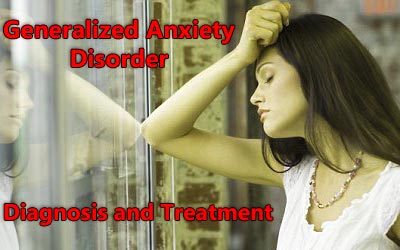Generalized anxiety disorder or short form GAD is identified as exaggerated anxiety issues and worrying about everyday life events with no apparent reasons. Individuals with symptoms of generalized anxiety disorder usually expect disaster and can't stop worries about health, money, family, work, or school etc. people having GAD, their worry is mostly unrealistic or out of proportion for the circumstances which is occurred during the patients’ phase of life. Daily lifegenerally becomesconstant state of worry, fear, and hypertension. Eventually, the anxiety dominates the person's mindset thatis interfered with daily routine work, which includes business and office work, school, social activities, and relationships, family.
GAD generally affects the way the person thinks, but anxiety may lead to physical symptoms, the Symptoms of GAD can includes, unrealistic view of his/her problems, Restlessness or a feeling of being on the edge, Irritability, Difficulty in concentrating, The need of going to the bathroom frequently, feeling Tired, Trouble falling or staying asleep, Trembling, Being easily startled.
In addition to this, people having GADusually haveother anxiety disorders like panic disorder or phobias, obsessive-compulsive behavior, clinical depression by taking overdose of medication, or additional problems with interaction of other drugs or misuse of alcohol.
Genetics plays an important role:
Some researchers do suggests that family historyalso playsa very important part in increasing the chances of anxiety disorders, a person may develop Generalized Anxiety Disorder. This means there is a possibilityto develop Generalized Anxiety Disorder which may be passed within the family members.
Environmental factors does affect GAD patients:
In an individual’s life Trauma and stressful events do takes place, such as abuse, the death of individuals loved one, divorce, changing jobs or schools, may contribute to Generalized Anxiety Disorder. Generalized Anxiety Disorder may also become worse during periods of depression. The use of medication and withdrawal from addictive substances, including alcohol, caffeine, and nicotine, can also worsen anxiety disorders.
There are number of types of treatment available which can help with Generalized Anxiety Disorder. There are many Supportive and interpersonal therapy which can help a person to overcome the anxiety issues. Cognitive behavioral treatment has been mostly researched by the researchers and specifically targets the ideas, thoughts, physical symptoms and behaviors includes the over-preparation, planning and avoidance that characterizes Generalized Anxiety Disorderalertness approaches and Acceptance of Committed Therapy have also been investigated with positivean outcome and good results. All therapies help peopleto change their relationship with symptoms. The treatment helps the patients to understand the nature of anxiety level, and to be less afraid of the presence of anxiety in a patient, and to help people make properchoices independent of the presence of anxiety. The adult treatments for Generalized Anxiety Disorder have been changed for children and teens and show and it shows positive outcomes.
Anxiety disorder treatment, Meditation, Relaxation techniques, doing yoga in an open space to get peace, exercise which improves concentration, and other treatments may also become part of a treatment plan.Other anxiety disorders such as depression, or narcotic abuse often accompanies Generalized Anxiety Disorder, which rarely occurs; frequently occurring conditions may also be treated with therapies.







